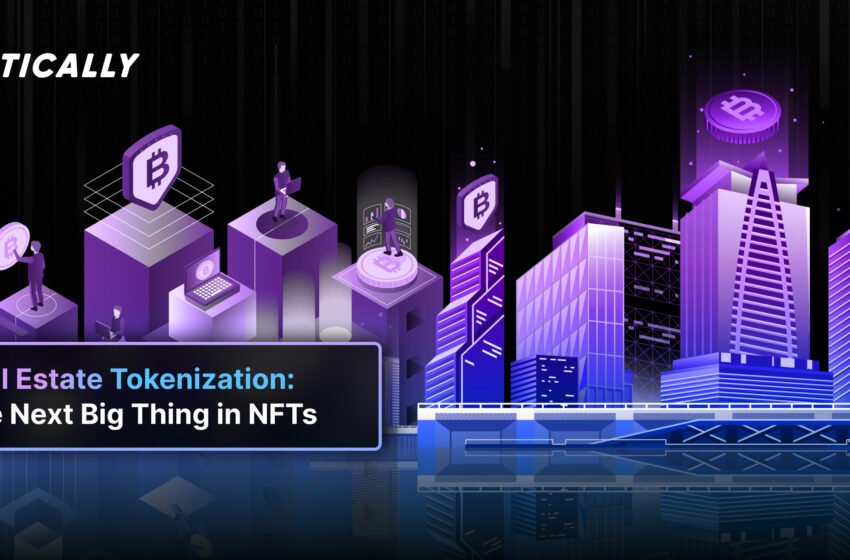Grayscale Says XRP Among Top Client Talking Points After Bitcoin
Real Estate Tokenization: The Next Big Thing in NFTs
(Originally posted on : NFTICALLY )
Have you ever wondered what the next big thing in non-fungible tokens (NFTs) might be? Well, it looks like real estate tokenization could be the future of NFTs.
Tokenizing real estate assets has become one of the most talked about topics in the blockchain world lately and for good reason. By tokenizing these assets, people can now invest in real estate without having to buy an entire building or property outright. It also allows investors to split up their investments into smaller chunks that are easier to manage while still providing them with a secure form of ownership.
So let’s take a closer look at how this works and why it could revolutionize the way we think about investing in real estate!
What is Real Estate Tokenization?
If you’re someone who’s interested in real estate investing or is simply a keen observer of the industry, you might have come across the term tokenization. At its core, tokenization refers to the transformation of an actual asset, like a piece of property, into smaller digital tokens. Each token represents a portion of the original asset, and these tokens can be traded or sold on the blockchain network securely.
So, what does this mean for real estate? Well, by using blockchain technology and smart contracts, property owners can fractionate their properties into smaller, more manageable pieces that can be sold to investors globally. This process makes it easier for investors to participate in real estate investments that would otherwise be unavailable to them.
Smart contracts are self-executing codes on the blockchain. They contain the terms of the agreement between buyer and seller being directly written into lines of code. This is where NFTs come into play. Non-fungible tokens (NFTs) are often associated with the artwork or digital collectibles but are also being used for real estate tokenization.
ERC-721 tokens, which are based on the Ethereum blockchain, are commonly used for NFTs in real estate tokenization. By using smart contracts, owners can encode the terms and conditions of the fractionalized property, such as who gets what portion of the earnings and who has what rights to use the property.
How Does Real Estate Tokenization Work?
Real estate tokenization is a revolutionary concept that has taken the real estate industry by storm. It is a process where a property is divided into small fractions using a smart contract on a blockchain network. This allows anyone who buys or owns a token to hold a part of the real estate as well as claim their proportionate share of the associated profits and losses.
For instance, imagine that you own a valuable property worth $100,000, but are in urgent need of cash. In such a situation, you could tokenize your property by dividing it into several digital tokens and offering them for sale in the market at an affordable price. The buyers could then invest in your real estate by purchasing as many tokens as they desire, thereby securing a share in your property.
Tokenization also allows for greater transparency, as it is done in a decentralized network. This means that all transactions are publicly recorded on the blockchain, ensuring complete transparency. This concept can be applied to various types of properties such as commercial, residential, or trophy assets.
High-priced commercial properties can also be divided into fractional slices, making it possible for small-scale investors to buy into more substantial assets. This enables property owners to liquidate their assets quickly while raising funds for their projects.
Moreover, tokenization is not limited to the tokenization of property only, but can also extend to any digitized share or portion of a deed, legal entity equity interest, or ownership of the collateralized debt. With the advent of NFTs, it is now possible to tokenize any asset with unique characteristics, creating new opportunities for investors and property owners alike.
What are the Benefits of Real Estate Tokenization?
Transparent and Efficient Transactions
The usage of the decentralized structure of blockchains ensures that the transactions are immutable and transparent. This makes them ideal for real estate with a string of stakeholders and complex procedures. Automated smart contracts eliminate any human role in conducting transactions, which in turn eliminates any unfair deals.
There is no paperwork or waiting time for the completion of transactions in tokenized real estate. This results in prompt action and quick transactions. Furthermore, there are no specific office hours to execute transactions when blockchain is used in real estate. Instead, the system works round-the-clock with transparency.
Better Liquidity
Real estate has long been considered a valuable asset for investors, but its lack of liquidity has been a persistent challenge. This has deterred many investors from venturing into the real estate industry, as it can take months or even years to sell a property. However, with the emergence of digital real estate ownership, tokenization has provided a powerful solution to this problem.
Tokenization involves dividing a real estate asset into fractional ownership units or tokens, which can be bought and sold on a digital platform. This process makes it easier for investors to access the real estate market and provides greater flexibility for buying and selling. Owners can sell their tokens quickly and easily, which leads to a swift change of ownership. This greatly enhances the liquidity of the real estate industry compared to traditional transactions.
Opportunity for Small-scale Investors
One of the primary benefits of real estate tokenization is that it significantly reduces the cost and barrier of entry into this asset class. Previously, investors would need to commit large amounts of capital to purchase a single property or stake in a real estate investment trust (REIT). However, tokenization allows investors to purchase small amounts of equity in multiple properties, diversifying their portfolios and minimizing risk.
Another advantage of real estate tokenization is that it provides investors with greater flexibility and control over their investments. Unlike traditional real estate investment vehicles like REITs, tokenization allows investors to directly own a share of the underlying asset. This gives investors greater transparency and control over their investments and can lead to better returns.
A Free-flowing Market
Real estate tokenization plays a pivotal role in creating a free-flowing market for the real estate sector. It introduces a decentralized financial system that is independent of biases and over-regulation, providing equal opportunities for all stakeholders to participate in the market.
The tokenization of real estate assets results in the fragmentation of ownership, where each shareholder has a controlling power to make collective decisions. This eliminates unnecessary hindrances and creates a streamlined market structure that is transparent and trustworthy. In addition, the tokenization approach offers flexibility and accessibility, allowing individuals who may not be able to afford a whole property to participate in the sector.
Decrease in Counter-party Risk
In traditional real estate transactions, there are multiple parties involved, each with their interests and motivations. These parties can include buyers, sellers, real estate agents, brokers, title companies, and banks. With so many people involved, there is always a risk that one of them will act in bad faith, potentially causing harm to others.
Real estate tokenization reduces counter-party risk by streamlining the transaction process and minimizing the number of parties involved. When a property is tokenized, it is converted into a digital asset that can be easily bought and sold on a blockchain platform. Smart contracts automate the process and eliminate the need for intermediaries. This ensures that the transaction proceeds smoothly and without the risk of fraud or misrepresentation.
Limitations of Real Estate Tokenization
- Smart Contract Security Loopholes: Although the blockchain network is considered secure, some loopholes need to be fixed when it comes to smart contracts. Hackers can breach smart contracts and steal money if they’re not regularly audited. Any hack or glitch in the system can leave real estate investors without their assets. Unfortunately, these assets can’t be recovered once they’re lost.
- Complex Licensing Requirements: Toeknized real estate assets require licensed platforms for the operations and management of STOs (Security token offerings). Acquiring a license can be a complicated procedure. Before achieving a license, enterprises are forced to experience multiple phases of testing and trial-and-error before they become successful.
- Regulatory Issues: Numerous employees in regulatory authorities and real estate have no understanding of how blockchain technology functions and supports the real estate industry. This unawareness can create a negative regulatory environment, obstructing the progress of all stakeholders. Investors lose confidence when faced with regulatory uncertainty, leading to poor growth.
- Tax Complexities: Various tax regimes worldwide have not provided regulations concerning cryptocurrency taxes, producing issues for stakeholders. Tokenization advantages are recognized globally; however, there is no sound taxation system yet. The lack of a uniform tax system generates skepticism in the minds of everyone involved.
Real estate tokenization has a lot of potential and it sparks advancement in the industry, increased liquidity, and fractional ownership. Despite the benefits, some challenges need to be addressed to make it viable for investors. Understanding the limitations and preventing them would allow tokenization to unlock the real estate industry’s potential.
Conclusion
Real estate tokenization has the potential to revolutionize how we invest in and transact real estate. By reducing counter-party risk, creating a transparent market structure, and allowing for fractional ownership, this technology promises to make investing more accessible than ever before.
However, there are still challenges that need to be addressed such as smart contract security loopholes, complex licensing requirements, regulatory issues, and tax complexities. If these limitations can be overcome then tokenized real estate could become an attractive option for investors around the world.
NFTICALLY provides a simple and hassle-free platform for you to launch your NFT marketplace and list tokenized assets along with non-fungible tokens. Visit the platform today and explore its benefits.








 Bitcoin
Bitcoin  Ethereum
Ethereum  Tether
Tether  XRP
XRP  USDC
USDC  Solana
Solana  TRON
TRON  Dogecoin
Dogecoin  Lido Staked Ether
Lido Staked Ether  Figure Heloc
Figure Heloc  Bitcoin Cash
Bitcoin Cash  WhiteBIT Coin
WhiteBIT Coin  Cardano
Cardano  USDS
USDS  LEO Token
LEO Token  Wrapped stETH
Wrapped stETH  Hyperliquid
Hyperliquid  Ethena USDe
Ethena USDe  Wrapped Bitcoin
Wrapped Bitcoin  Chainlink
Chainlink  Binance Bridged USDT (BNB Smart Chain)
Binance Bridged USDT (BNB Smart Chain)  Canton
Canton  Monero
Monero  Stellar
Stellar  USD1
USD1  Wrapped eETH
Wrapped eETH  Rain
Rain  sUSDS
sUSDS  Dai
Dai  Hedera
Hedera  Litecoin
Litecoin  PayPal USD
PayPal USD  Coinbase Wrapped BTC
Coinbase Wrapped BTC  Zcash
Zcash  Avalanche
Avalanche  Shiba Inu
Shiba Inu  WETH
WETH  Sui
Sui  Toncoin
Toncoin  Cronos
Cronos  USDT0
USDT0  World Liberty Financial
World Liberty Financial  Tether Gold
Tether Gold  PAX Gold
PAX Gold  MemeCore
MemeCore  Uniswap
Uniswap  Polkadot
Polkadot  Mantle
Mantle  Ethena Staked USDe
Ethena Staked USDe  BlackRock USD Institutional Digital Liquidity Fund
BlackRock USD Institutional Digital Liquidity Fund  Aave
Aave  Falcon USD
Falcon USD  Aster
Aster  Pepe
Pepe  Bittensor
Bittensor  Global Dollar
Global Dollar  OKB
OKB  Bitget Token
Bitget Token  Circle USYC
Circle USYC  Ripple USD
Ripple USD  syrupUSDC
syrupUSDC  HTX DAO
HTX DAO  Pi Network
Pi Network  Sky
Sky  BFUSD
BFUSD  Ethereum Classic
Ethereum Classic  NEAR Protocol
NEAR Protocol  Ondo
Ondo  Superstate Short Duration U.S. Government Securities Fund (USTB)
Superstate Short Duration U.S. Government Securities Fund (USTB)  Pump.fun
Pump.fun  Internet Computer
Internet Computer  Gate
Gate  POL (ex-MATIC)
POL (ex-MATIC)  KuCoin
KuCoin  Cosmos Hub
Cosmos Hub  Worldcoin
Worldcoin  Jupiter Perpetuals Liquidity Provider Token
Jupiter Perpetuals Liquidity Provider Token  Midnight
Midnight  NEXO
NEXO  Jito Staked SOL
Jito Staked SOL  USDtb
USDtb  Ethena
Ethena  Spiko EU T-Bills Money Market Fund
Spiko EU T-Bills Money Market Fund  Binance-Peg WETH
Binance-Peg WETH  Official Trump
Official Trump  Rocket Pool ETH
Rocket Pool ETH  Algorand
Algorand  Binance Bridged USDC (BNB Smart Chain)
Binance Bridged USDC (BNB Smart Chain)  USDD
USDD  Render
Render  Wrapped BNB
Wrapped BNB  Janus Henderson Anemoy AAA CLO Fund
Janus Henderson Anemoy AAA CLO Fund  Function FBTC
Function FBTC